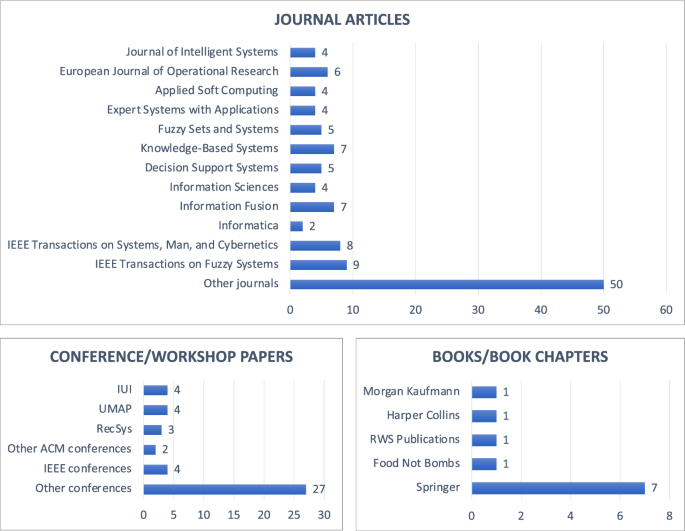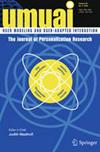群体决策和群体推荐系统的共识模型概述
IF 3.5
3区 计算机科学
Q2 COMPUTER SCIENCE, CYBERNETICS
引用次数: 0
摘要
群体决策过程可以由群体推荐系统支持,帮助群体用户获得满意的决策结果。这些系统整合了一个达成共识的过程,允许小组成员就潜在的项目相互讨论,相应地调整他们的意见,并就选定的项目达成一致。因此,这样的过程有助于生成小组成员高度满意的小组建议。我们的文章提供了一个严格的审查,现有的共识方法,以群体决策。这些方法根据应用的共识模型进行分类,如参考域,其中选择一组组成员或项目来计算共识度量,巧合方法,根据巧合概念计算组成员之间的共识程度,聚合用户偏好的算子,指导措施,其中达成共识的过程由不同的共识度量指导,以及建议的产生和个人的中心性,在达成共识的过程中增强了主持人或领导者的作用。本文还讨论了在异质和大规模群体中群体决策的进一步共识技术。此外,为了提供共识方法的整体景观,我们还讨论了群体推荐系统中的新共识模型。这些模型试图改进基本的聚合策略,进一步考虑社会关系的相互作用,并为群体成员提供关于群体当前共识状态的直观描述。最后,我们指出了挑战,并讨论了未来工作的开放性问题。本文章由计算机程序翻译,如有差异,请以英文原文为准。

An overview of consensus models for group decision-making and group recommender systems
Abstract Group decision-making processes can be supported by group recommender systems that help groups of users obtain satisfying decision outcomes. These systems integrate a consensus-achieving process, allowing group members to discuss with each other on the potential items, adapt their opinions accordingly, and achieve an agreement on a selected item. Such a process, therefore, helps to generate group recommendations with a high satisfaction level of group members. Our article provides a rigorous review of the existing consensus approaches to group decision-making. These approaches are classified depending on the applied consensus models such as reference domain where a set of group members or items is selected for calculating consensus measures, coincidence method that calculates the consensus degree between group members depending on the coincidence concept, operators that aggregate user preferences, guidance measures where the consensus-achieving process is guided by different consensus measures, and recommendation generation and individual centrality that enhance the role of a moderator or a leader in the consensus-achieving process. Further consensus techniques for group decision-making in heterogeneous and large-scale groups are also discussed in this article. Besides, to provide an overall landscape of consensus approaches, we also discuss new consensus models in group recommender systems. These models attempt to improve basic aggregation strategies, further consider social relationship interactions, and provide group members with intuitive descriptions regarding the current consensus state of the group. Finally, we point out challenges and discuss open topics for future work.
求助全文
通过发布文献求助,成功后即可免费获取论文全文。
去求助
来源期刊

User Modeling and User-Adapted Interaction
工程技术-计算机:控制论
CiteScore
8.90
自引率
8.30%
发文量
35
审稿时长
>12 weeks
期刊介绍:
User Modeling and User-Adapted Interaction provides an interdisciplinary forum for the dissemination of novel and significant original research results about interactive computer systems that can adapt themselves to their users, and on the design, use, and evaluation of user models for adaptation. The journal publishes high-quality original papers from, e.g., the following areas: acquisition and formal representation of user models; conceptual models and user stereotypes for personalization; student modeling and adaptive learning; models of groups of users; user model driven personalised information discovery and retrieval; recommender systems; adaptive user interfaces and agents; adaptation for accessibility and inclusion; generic user modeling systems and tools; interoperability of user models; personalization in areas such as; affective computing; ubiquitous and mobile computing; language based interactions; multi-modal interactions; virtual and augmented reality; social media and the Web; human-robot interaction; behaviour change interventions; personalized applications in specific domains; privacy, accountability, and security of information for personalization; responsible adaptation: fairness, accountability, explainability, transparency and control; methods for the design and evaluation of user models and adaptive systems
 求助内容:
求助内容: 应助结果提醒方式:
应助结果提醒方式:


